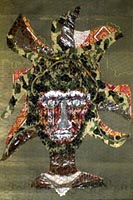 A Country Rag Through the Looking Glass ~ Reality
A Country Rag Through the Looking Glass ~ Reality
|
Midi music file (click on title): Dueling Banjos, Foggy Mountain Breakdown, Johnny Be Good
|
 graphic: Street Festival NSF, Jonesborough, TN
graphic: Street Festival NSF, Jonesborough, TN
 "Things are going to slide in all directions Won't be nothing Nothing you can measure any more The blizzard of the world has crossed the threshold and it has overturned the order of the soul When they said REPENTrepentREPENTrepentREPENT I wonder what they meant" -- The Future, More Best of Leonard Cohen"In a cross-cultural study of affection and aggression done at McDonald's playgrounds, pre-schoolers in France playfully touched each other twice as much as US children did, but while the French children acted aggressively only 1 percent of the time, the US youth did so 29 percent of the time. "Anthropologists have long known that cultures that shower physical affection on young children have little adult violence, dating back to Margaret Mead's studies in New Guinea. But the study in McDonald's playgrounds in France and the United States, along with other new evidence, suggests that it's time for America to take another look at how it raises its children, particularly boys, to stop the crisis of violence, researchers said at the nation's largest annual psychological association meeting. "There's got to be some relationship between a lack of touching and violence, said Tiffany Field, MD of the University of Miami Medical School, who conducted the study at the McDonald's playgrounds especially since international statistics have consistently shown that France has the lowest homicide rate of developed nations, while the United States has the highest. "Dr. Field said she fears there will be even less physical affection toward children in our society as a result of teachers and day care providers worrying about accusations of sexual abuse." -- Why Are American Boys So Aggressive?, Asheville Magazine
|
|
"A premonition of the future West Africa is becoming the symbol of worldwide
demographic, environmental, and societal stress, in which criminal anarchy
emerges as the real 'strategic' danger. Disease, overpopulation, unprovoked
crime, scarcity of resources, refugee migrations, the increasing erosion of
nation-states and international borders, and the empowerment of private
armies, security firms, and international drug cartels are now most
tellingly demonstrated through a West African prism. West Africa provides an
appropriate introduction to the issues, often extremely unpleasant to
discuss, that will soon confront our civilization. To remap the political
earth the way it will be a few decades hence-as I intend to do in this
article-I find I must begin with West Africa. "...In Sierra Leone, as in Guinea, as in the Ivory Coast, as in Ghana, most of the primary rain forest and the secondary bush is being destroyed at an alarming rate. I saw convoys of trucks bearing majestic hardwood trunks to coastal ports. When Sierra Leone achieved its independence, in 1961, as much as 60 percent of the country was primary rain forest. Now 6 percent is. In the Ivory Coast the proportion has fallen from 38 percent to 8 percent. The deforestation has led to soil erosion, which has led to more flooding and more mosquitoes. Virtually everyone in the West African interior has some form of malaria." -- Robert D. Kaplan, The Coming Anarchy: Shattering the Dreams of the Post Cold War
|
"The Internet would not exist without people using this [free-thinking] sort of creativity and theorizing -- things that would be difficult to do without altering their consciousness....Governments, corporations -- all of them are attempting to manipulate consciousness in one particular way.... The government should not be in the business of policing thoughts, by authorizing acceptable states of mind and outlawing others.... How are other aspects of cognitive liberty being infringed upon in ways we haven't thought of yet? Wearable computers, chip implants, increasingly connected human beings -- these kinds of changes, while intriguing, need to be considered seriously before their effects go unnoticed....How much of technology is already aimed at controlling people's desires? It becomes a battle over consciousness." -- Richard Glen Boire, Executive Director Alchemind Society/International Association for Cognitive Liberties "The interface between bodies, brains, and technology is an area of daunting theoretical and practical possibilities. This is an area we really hope to map out and monitor as part of Alchemind's mission to protect and promote 'cognitive liberty'....I have still not come upon theorists who articulate the consequences for cognition when a transition to immediate 'downloading' into the brain could replace the necessity to build one's own synapses....If it [direction of technology] continues, there's going to be an effect on our ability to use our minds." -- Wrye Sententia, Operators Mannager Alchemind Society/International Association for Cognitive Liberties from Free Thinkers in the Digital Age by Chris Oakes, Wired News 3/28/2000  "Early in our nation's history, attempts were made to enslave Native
Americans, but that population was irrepressible. This had been their land
for thousands of years, and it was very difficult to crush their cultural
identity and fighting spirit as a result. On the other hand, the African
history and identity of black slaves was ripped from them as they were
kidnapped and dispossessed. The removal of their African culture was as
devastating as the chains and dogs. Destroying the cultural identity of a
people is a necessary component of enslaving them. No ruling class in
history has given up power without a struggle, and no underclass has ever
waged such a struggle without a cultural identity that unifies the class and
forges a fighting spirit." -- Steps Toward a Culture of Liberation, Manifesto of the Omnicircus
"Early in our nation's history, attempts were made to enslave Native
Americans, but that population was irrepressible. This had been their land
for thousands of years, and it was very difficult to crush their cultural
identity and fighting spirit as a result. On the other hand, the African
history and identity of black slaves was ripped from them as they were
kidnapped and dispossessed. The removal of their African culture was as
devastating as the chains and dogs. Destroying the cultural identity of a
people is a necessary component of enslaving them. No ruling class in
history has given up power without a struggle, and no underclass has ever
waged such a struggle without a cultural identity that unifies the class and
forges a fighting spirit." -- Steps Toward a Culture of Liberation, Manifesto of the Omnicircus
graphic: Wise Woman, mixed media fabric wallhanging by Margaret Gregg, Mill Creek Studio, Limestone, TN |
|
White House E-mail automated to the Executive branch. Congressional E-mail automated service by the New York Times. Enter your zip code to display the names of your representatives and express your sentiments in an electronic message to any or all of them. You'll also get an e-mail copy for your own records.
"Women make up almost half the world's population, and around the world they are struggling to raise the standard of social and political equality with men. Yet, whether it's gaining the right to own property in African countries, equal pay for work that men do too, or learning to read (out of the world's 960 million illiterates, two-thirds are women), there is progress every day. "Since 1960, women have been elected as their nations' leaders in ten countries (Ireland, Britain, Israel, India, Pakistan, Sri Lanka, Finland, Canada, Nicaragua, Philippines). In many developed countries, women outnumber men in higher education. About 70 percent of working-age women worldwide now work outside the home.Ten Thousand Newspapers on the Internet has links by country, province, state, and locality for news sources worldwide, many of which list names, postal and e-mail addresses for contacting elected and appointed representatives in each area. "As far as I'm concerned, the Internet is democracy. At Tiananmen, we had a dream. We had to give it up, but we've found a more effective way to help our country. I'm still pushing for the freedom we fought and died for in '89. And I believe the Internet is a powerful tool. Eventually it will even transform China." -- Ling Chai (as quoted in ZDNet 3/19/2000), former "chief commander" and spokesperson for Chinese student dissidents, who received asylum and higher education in the United States, now CEO of Jenzabar Return to Consciousness ~ Reality ~ Responsibility ~ Freedom |

 How did I get here anyway? --
Take me to Appalachia
How did I get here anyway? --
Take me to Appalachia 
Original material © A Country Rag April 1996, 2000. All rights reserved.